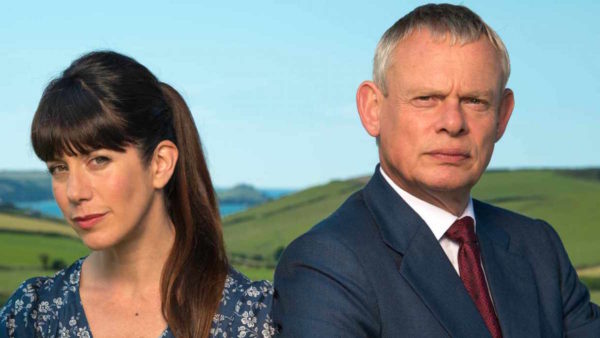For a good chunk of Martin Clunes’ year, the transformation is total.
The suit and tie go on; the glower returns. He becomes a country doctor with a city soul; he becomes a guy with great medical skill – unless blood is involved – and an awful bedside manner.
Then the “Doc Martin” filming ends and he reverts to being the opposite. “I’m far too keen to please,” said Clunes (shown here with Caroline Catz, who plays is wife). “I wish I had his ability to explain to people that he is always right and they are wrong.”
Now a new season begins across two continents: Each Wednesday, an episode debuts in England; the next day, it reaches North America via Acorn, a modest streaming service — it recently passed the million-subscriber mark – that imports shows with British-type charm.
And yes, “Doc Martin” is charming. That includes the townspeople – the season-opener has a dandy moment involving the pub-owner – and the doctor himself. As the season starts, he’s racing to medical emergencies, while facing the prospect of losing his license.
“We all want to watch a posh man who has to change his life,” Clunes said. “And we want to see him sometimes walk into a door frame.”
It’s the ninth season, spread over 15 years. New viewers keep finding the show via Acorn or DVD or reruns on individual PBS stations; and all of this has sort of happened by accident.
Like the doctor he plays, Clunes was a city guy. He grew up in the Wimbledon district of London, related to show-business people. His father, Alec Clunes (who died when Martin was 8) was an actor and theater producer; his uncle, Jeremy Britt, was PBS’ most frequent Sherlock Holmes.
Clunes “didn’t have any doubts” about being an actor. He had some low-paying jobs – restaurant-worker and theater roles – then scored in TV comedy. “I’m funny-looking,” he explains.
Well, unusual-looking. He’s tall (6-foot-3), with wide ears in the Prince Charles mode. Like other oversized Englishmen (John Cleese, the late Peter Cook), he projects a sense of pseudo-authority.
Clunes won a British Comedy Award in “Men Behaving Badly” and has been nominated for four other shows. He did movies, including a supporting role in “Saving Grace” (2000), playing a casually dressed doctor who smoked marijuana with the locals.
The character was spun off into two TV movies; then the production company went broke and others weren’t interested. “A pot-smoking, kind of hippie doctor wasn’t what their audience was looking for.”
So the character was changed to Dr. Martin Ellingham, a top London surgeon who developed a fear of blood. Retreating to the Cornish village where he spent boyhood summers, he became the only doctor there. Many things annoyed him, including the fact that villagers called him Doc Martin.
That city guy/small town plot keeps being recycled, from “Northern Exposure” to “Doc Hollywood” to Hallmark movies. It’s at the core of Acorn’s “800 Words” and “The Heart Guy” … and Clunes’ life.
He and his wife (producer Philippa Braithwaite) have a farm, a couple counties away from Port Isaac, the fishing village where “Doc Martin” is filmed. That brings a different life. “It’s being aware of the seasons,” he said from a phone at home. “It’s being able to sit here and look out at nature.”
Clunes had worried that their daughter (now in college) would be restless away from the city. She wasn’t, he said. “We were driving back here and she said, ‘Oh, I’m glad we live in the country.’”
He races off to other acting projects, but avoids the hype and fuss that Americans refer to as a “dog and pony show.” Clunes hadn’t heard that expression; back home, he has an almost-annual fundraiser that actually is a dog and pony show. “The last one had 16,000 people.”
Then it’s time to film a new season. For a five-month stretch, they rent a home near Port Isaac, big enough for their four dogs. The suit and tie return; so does the glowering, grumbling Doc Martin.
— “Doc Martin,” www.acorn.tv. New episodes Thursdays, Sept. 26 to Nov. 14
